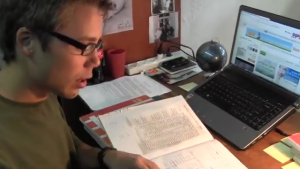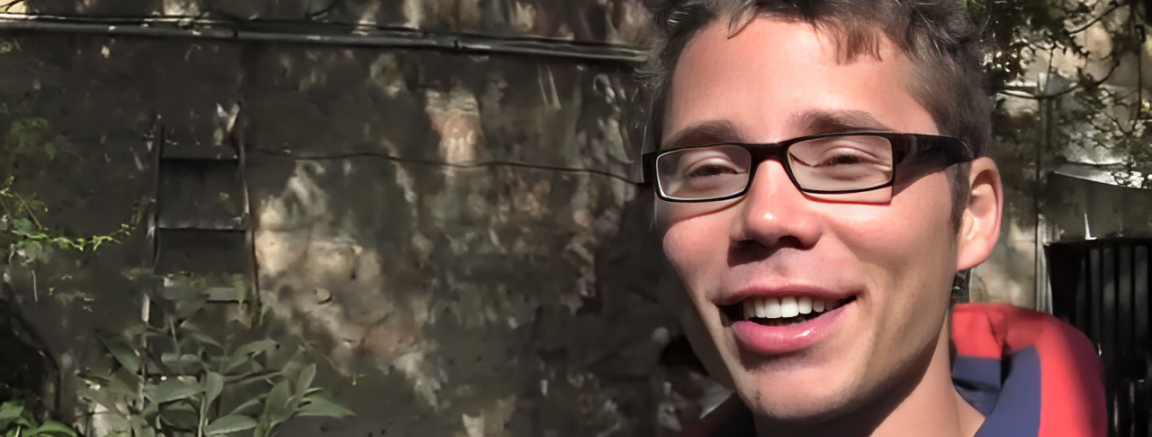Language learning has not always been easy for me, or a joy. In high school I was a mediocre Spanish student, struggling through courses I did not like, earning grades I was not proud of. I considered at the time that I was simply a poor language student, and always would be. Hebrew proved different, however, and this because my formal study of the language was built on a foundation of personal motivation and interest. I was bound to do better, because I liked it.
Professional Life: Public Relations Coordinator at Shevet Achim (Shevet.org.), a non-profit organization in Jerusalem that assists Middle Eastern children in receiving open-heart surgery in Israeli hospitals.
Education: BA in Biblical Literature from Northwest University in Kirkland, Washington. Ongoing graduate work in religion and philosophy at the Gordon Conwell Theological Seminary in Boston, Massachusetts and the Hebrew University of Jerusalem.
Professional Application
“My job requires me to use Hebrew every day,” Ryan says. “My position is in public relations… It is clear to me that were I not actively learning Hebrew, my ability to do my job would be greatly diminished. Reading, writing, speaking, listening… it is all important.”
Ryan’s work at Shevet Achim takes him all over Israel. His ability to speak Hebrew is essential to the success of the organization. When assisting a child in receiving life saving surgery he is required to entertain visitors; assist children in crossing borders; and speak with co-workers, doctors, and the Israeli public; all in Hebrew.
While it started as just a hobby when he was just 18, Ryan’s study of Hebrew has opened doors to opportunities that would have been unavailable to a non-Hebrew speaker.
“Because we are in Israel, and the Israeli public speaks Hebrew, I speak Hebrew too,” Ryan says. “When Israelis stop by to visit a sick or recovering child– a common occurrence– I host them in Hebrew. When people knock on our door or call on the telephone, chances are that they speak Hebrew. Some of my coworkers only speak Hebrew.”
Course of Study (Study Abroad and Challenges)
Ryan began studying Hebrew at age 18 in Montana. When he went off to school in Seattle, he found a native speaking partner through the local synagogue: “A couple times a week I rode my bicycle the twelve miles to their house…we’d practice Hebrew over a game of ping pong or just identifying household items. Those were my first steps at spoken Hebrew.”
His graduate studies took him to the Hebrew University in Jerusalem where he decided to dedicate himself to studying Hebrew intensively. He tested so well that he was exempted from level 1. Ryan describes his first week of Level 2 instruction as being “horrible” and “hellacious.” He says, “The level of Hebrew in the class was way beyond my ability, and I felt pretty foolish. The class would be clipping along with a conjugation exercise of some sort, and when it got to me, the gears of the room would grind to a halt, my face would flush, and I would have no idea how to answer.”
Instead of giving up, Ryan dove into some serious self-study. After a month he started over at the beginning of Level 2, where he found his groove and has gone onto to find success. He says, “The goal for me is to learn the language–or rather, to experience the joy the language gives me–and I look at Hebrew class as accelerating that goal, not as the goal itself. I read newspapers, watch the news, listen to music, in Hebrew.”
Advice to Prospective and Current Language Students
“Sit back and recognize the simple and universal beauty of language; [don’t] become overly focused on a course grade or an assignment,” Ryan advises. “Here’s a truth that you will discover when you commit yourself to seriously learning Hebrew [or any language]: a language is an enormous thing. There are thousands of words, and idioms, and nuances of inflections, and slang terms, and research terms, and, and, and… But don’t be deflated. Appreciate it! Surround yourself with as much of the language as you can. It is so gratifying, after you push through overwhelming or dry times of study, to sit in a Hebrew language lecture on some subject, and afterwards say to yourself, “Wow, I understood almost every word!”
He goes on to share some of his language learning tricks, “When I’m out and about in Jerusalem and see or hear a word I don’t know, I jot it down on a scrap of paper, or if I don’t have one in my pocket, on the back of my hand, and look it up when I get home. Some days my hand is scrawled with scores of words. The Orthodox use phylacteries, I just eliminate the box.”
